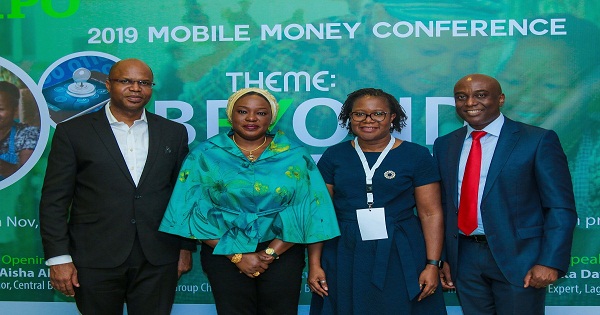The burden of delivering financial inclusion to the last mile has become one that needs the strategic participation of all industry stakeholders in the ecosystem, so as to deliver value propositions that will deepen financial services culture for the benefit of the citizenry.
These were the views of participants at the 2019 Mobile Money Conference, organized by Association of Licensed Mobile Payment Operators (ALMPO).
The event themed: ‘Beyond Payments’ was held on Wednesday, 27th November, 2019 at Four Points by Sheraton, Victoria Island, Lagos.
Chinedu Onuoha, chairman, Association of Licensed Mobile Payment Operators (ALMPO), noted that the aims of financial inclusion should not be limited to payments alone, that is, paying and receiving of money.
He stated that financial services should be made to cover areas that are germane for the average citizen if we are to achieve the objectives of financial inclusion.
He explained that financial services should be all encompassing and focused on rendering everyday services that go beyond payments services.
According to him, “The theme of this year’s conference aptly captures the general direction of the industry. We are of the opinion, and rightfully so, that for the objectives of financial inclusion to be realized, we must go beyond payments, as we try to attract more people into formal financial services.
“We are aware that the financial needs of the average citizen are much more than pay and receive. People want to save and earn interest.
“They want to participate in pensions, they need some form of insurance, and many more. We also know that for all of this to realized, there must be adequate security and trust in the system.”
Onuoha called for collaboration of security agencies and other government agencies, which according to him, would create the right synergy that will secure the payment system and provide adequate protection to operators as they go about their business.
Aishah Ahmad, deputy governor, Financial Systems Stability, Central Bank of Nigeria (CBN), stated that Mobile Money (MM) is vital to CBN as a regulator and as such, they are open to suggestions on the way forward, without holding on to rigid regulations.
Ahmad who was represented by Aisha Isa-Olatinwo, assistant director, Payments System Management Department, CBN, noted that since estimated reports show that Nigeria has over 100 million unique mobile numbers, if mobile money operations work, there will be over 100 million subscribers.
She enjoined everybody present at the conference to work together to create a success story that will be beneficial to the ecosystem and the entire citizenry.
Uzo Eziukwu, group CEO, BlueTag Group, in a keynote address said that Mobile Money is fast becoming Africa’s legacy to the world, using Kenya’s MPESA as a typical example, doing about 1.7 billion transactions per year and making up to 50% of Kenya’s GDP.
He revealed that there are over 120 Mobile Money Operators (MMOs) in Sub-Saharan Africa (SSA), and they came into Nigeria in 2010 with a focus to drive financial inclusion and as an adjunct to mainstream banking.
He dissected the journey of MM in Nigeria into four stages, according to him, the first stage was the pilot stage between the years 2010 and 2012, which served as linkage of MM into mainstream banking.
According to the Eziukwu, “this was a time to understand the regulatory environment and regulators. This period saw confusion between collaboration and competition.
“This stage saw operators understanding the peculiarities and challenges of the Nigerian landscape. The need to collaborate and align effectively with telcos was also noticed.This stage had the challenges of integration and knowledge sharing”.
The second stage, according to him began from 2013 to 2015, which saw constructive engagement and alliance, as bank and non-bank MMOs engaged with one another and CBN. Also, partnerships arose between MMOs and banks, as CBN further streamlined MM policies.
“These moves saw growth in MM adoptions and in the number of bank accounts, noting also that this stage saw significant growth in MM acceptance driven majorly by the already banked.
He further revealed that innovation in mobile money operation has to be wrapped around consumer needs and not just payments, needs like micro-credits and service-based lending.
He also suggested products to be created for those at the bottom of the pyramid, products like health insurance, micro-pension, interest-based micro-savings, and rotational savings.
Acknowledging that the theme of the conference was apt, he concluded by sharing that as MM is moved forward, the sound benefits of financial inclusion will be unraveled.
Professor Olayinka David-West, academic director, Lagos Business School, delivering a paper Titled ‘Harnessing New Opportunity Areas for Mobile Money Adoption in Nigeria’, decried that only 4% increase in digital payments was recorded since 2016.
She further revealed that out of the estimated 99.8 million adults in Nigeria, only 3.3 million are MM users, and of the 36.8% excluded, most are women.
She reminded that engaging the bottom of the pyramid does more than gaining financial inclusion, but it also enhances the social and economic development of the society.
She also shared that a compelling value proposition is needed to get the attention of the customers. She argued that if the products and services don’t fill the proposition, MM won’t get to the Promised Land.
She also talked about taxes and levies, cybersecurity and fraud, connectivity and power, sharing how the setbacks and challenges in the sectors affect the adoption of MM by the masses.
Mrs Bunmi Ogunlewe, head of Product, e-tranzact, who spoke about shared services platforms as enablers for Mobile Money Growth, said that with the various needs faced by people at the bottom of the pyramid, collaboration is needed to address them.
She advised that the MMOs should come together and build an informed credit system which will help in the journey of MM through the last mile.
She shared that while each MMO collates data, until collaboration is done the data will be useless whereas with collaboration, fresh, enormous, insight will be gotten.
She opined that shared services and shared infrastructure will help get an additional 50 million customers and without shared platform services, the adoption and growth hoped for by MMOs won’t be attained.
The conference had different panel sessions that proffered solutions on how we can reach the last mile and as well set a new agenda for the next decade which will see the implementation of the solutions achieved in driving financial inclusion in Nigeria and indeed Africa.


















































